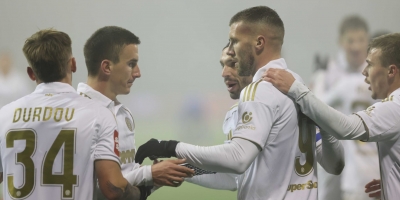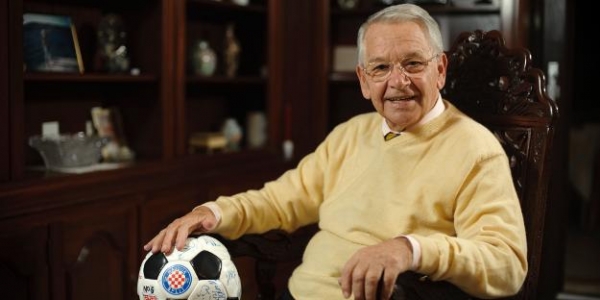

On this day, four years ago, a legendary Hajduk coach Tomislav Ivić passed away. Here is what the sports writer Jurica Gizdić wrote about him.
It's enough to say: the most successful Croatian football coach, a man who won everything he could. It's Tomislav Ivić, a long-time coach of Hajduk, once the member of the coaching staff of the Yugoslavia national team, and the Croatia's national team coach.
Tomislav Ivić was born in Split on June 30, 1933. He was a senior football coach-instructor, and permanent expert associate in the Croatian Football Association. He started his sports career in 1950 as a player in the RNK Split Academy. He collected 11 caps playing with Hajduk. As we have already said, he is the most successful Croatian football coach ever, and one of the top 20 most successful coaches in the world. It can be said he was the football visionary. He was a brilliant tactician who made a strong contribution to a football game development. Ha has won trophies in no less than five countries: Yugoslavia, the Netherlands, Belgium, Portugal and Spain.
Ivić' coaching career began with the year-long engagement in RNK Split from 1967 to 1968. From 1968 to 1972 he was the coach in the Hajduk Academy, and in 1972 he takes over the White's first team. However, the end of 1972 and part of 1973 he was coaching the then second division team Šibenik. After that, he returned to Hajduk to stay till 1976. During that time, he won two national championships, in seasons 1973/74 and 1974/75.
Coaching Hajduk he also won four Yugoslav Cups in 1972, 1973, 1974, and in 1975/76 season. From 1976 to 1978 he was the head coach in Ajax Amsterdam, winning a championship and the national Cup. He returned to Hajduk in 1978, and wins another championship. Next year, he moved to Brussels, to Anderlecht, and won the Belgian championship before he left in 1983. Next stop is Turkey, coaching Galatasaray 1983 and 1984. Next two years he was the head coach in Dinamo Zagreb, and in 1985 and 1986 in Avellino in Italy. In 1986 and 1987 he was in Panathinaikos (Greece), briefly in Hajduk in 1987, and in 1987 and 1988 in Porto. With that team he won Portuguese championship and Cup, European Super cup, and Intercontinental cup. In 1988 he was hired by the Paris St Germaine, and stays there till 1990. Next two years Ivić spent in Atletico Madrid, winning Spanish Cup. In 1991 and 1992 he was coaching Olimpique Marseille, in 1992-93 in Benfica of Lisbon. After that he returned to Porto for a season 1993/94. From 1994 to 1996 he was a technical director of the Croatia national team, and he was also a head coach in a match vs Italy in Palermo, on November 16 1994, when he achieved a key EURO qualification victory of 2-1.
From 1996 to 1997 he coached the United Arab Emirates team, and then returns again to Hajduk in 1997, this time as a sports director, but also as a coach in few matches.
In 1998 he became a head coach of the Iran's national team, followed by coaching of Standard Liege in Belgium till 2001. New job in Olimpique Marseille begins in 2001, and lasts till 2002. By the end of 2004 he was the head of the coaching staff in Al Ittihad of Saudi Arabia, followed by the job of the advisor in Standard.
His biography and career speaks for itself.
Still, ever since the 1970s the main question in Split is whether Hajduk's golden generation lead by Ivić could have done more, especially in the international competition. Here is what Ivić had to say on this:
"Like any other club, Hajduk needed logistics, expertise and players. In all three, Hajduk had overgrown Yugoslavia, but not Europe. To be the European champion, you need to be perfect in all three. Neither I wasn't at my best, I was still growing, together with my team. If that team have stayed together, I'm sure it would be the European champion, and would become a permanent value. As soon one of those factors cracked, Hajduk began its fall. I was the first to leave, then some players, and the worst strike came when President Tito Kirigin left. Without him, Hajduk was without a vision," said Ivić once.
Whether Hajduk could have achieved more with Ivić, sports critics should say. However, it's a clear fact that Ivić was the most successful coach in a history of Hajduk and Croatian football with 15 national championships and Cups, with the European Super cup, as well as Intercontinental Cup.
He was also awarded with numerous awards, like the City of Paris Chart in 1990, Croatian Olympic Committee trophy in 2003, and member of the Split Sports House of Fame since 2009.
Tomislav Ivić died in Split, on June 24 2011, and was buried at the Lovrinac Cemetery.